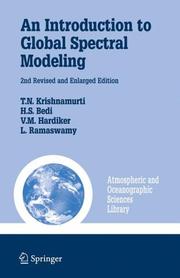| Listing 1 - 2 of 2 |
Sort by
|
Book
ISBN: 0197560768 1280527870 9786610527878 0198025491 1429401257 9780198025498 Year: 1998 Publisher: New York Oxford University Press
Abstract | Keywords | Export | Availability | Bookmark
 Loading...
Loading...Choose an application
- Reference Manager
- EndNote
- RefWorks (Direct export to RefWorks)
This is an introductory text on numerical weather prediction (numerically modelling the general circulation of the atmosphere), utilizing the spectral transform method. The book covers finite difference methods and time-differencing schemes; the theoretical development of the spectral transform method (using spherical surfaces rather than grids for determining variation in the elements of weather); physical processes; current issues in dynamical and physical initiation; and data analysis. Several practical examples of the spectral transform method are included.
Numerical weather forecasting. --- Spectral theory (Mathematics) --- Mathematical weather forecasting --- Physical weather forecasting --- Weather forecasting --- Functional analysis --- Hilbert space --- Measure theory --- Transformations (Mathematics) --- Weather forecasting. --- Forecasting, Weather --- Short range weather forecasting --- Weather --- Weather prediction --- Geophysical prediction --- Forecasting

ISBN: 0387302549 0387329625 Year: 2006 Publisher: New York, NY : Springer New York : Imprint: Springer,
Abstract | Keywords | Export | Availability | Bookmark
 Loading...
Loading...Choose an application
- Reference Manager
- EndNote
- RefWorks (Direct export to RefWorks)
Numerical weather prediction is receiving increased attention as weather forecasters aim to improve the numerical models used to forecast the weather. This is a textbook on global spectral modeling, which is an important component for global weather forecasts at numerous operational centers. This book covers all areas of model development including numerical analysis, treatment of clouds, mountains, radiation, precipitation processes, and the surface layers over land and the ocean. The objectives of this book are to provide a systematic and sequential background for students, researchers, and operational weather forecasters in order to develop comprehensive weather forecast models. This is designed for a one semester introductory graduate level course on weather prediction methodologies. As a prerequisite it requires a basic background in meteorology, applied mathematics, and numerical analysis.
Earth sciences. --- Meteorology. --- Geophysics. --- Atmospheric sciences. --- Environmental sciences. --- Earth Sciences. --- Atmospheric Sciences. --- Geophysics/Geodesy. --- Earth Sciences, general. --- Environmental Monitoring/Analysis. --- Environmental Physics. --- Environmental science --- Science --- Aerophysics --- Meteorology, Physical --- Physical meteorology --- Atmospheric science --- Geological physics --- Terrestrial physics --- Earth sciences --- Physics --- Aerology --- Geosciences --- Environmental sciences --- Physical sciences --- Physical geography. --- Geography. --- Monitoring/Environmental Analysis. --- Geography --- Cosmography --- World history --- Numerical weather forecasting. --- Environmental monitoring. --- Biomonitoring (Ecology) --- Ecological monitoring --- Environmental quality --- Monitoring, Environmental --- Applied ecology --- Environmental engineering --- Pollution --- Atmospheric sciences --- Atmosphere --- Measurement --- Monitoring --- Atmospheric science.
| Listing 1 - 2 of 2 |
Sort by
|

 Search
Search Feedback
Feedback About UniCat
About UniCat  Help
Help News
News